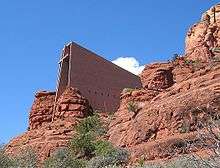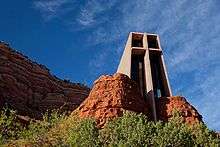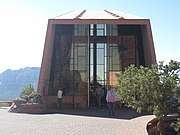Chapel of the Holy Cross (Sedona, Arizona)
The Chapel of the Holy Cross is a Roman Catholic chapel built into the buttes of Sedona, Arizona. The chapel is under the episcopal see of the Roman Catholic Diocese of Phoenix and its ministry is conducted by St. John Vianney Parish, Sedona.[1]
| The Chapel of the Holy Cross | |
|---|---|
 | |
| Religion | |
| Affiliation | Catholic Church |
| Location | |
| Location | Sedona, Arizona |
| Architecture | |
| Architect(s) | Marguerite Brunswig Staude |
| Completed | 1957 |
| Designated as NHL | National Register of Historic Places |
History
The chapel was inspired and commissioned by local rancher and sculptor Marguerite Brunswig Staude, who had been inspired in 1932 by the newly constructed Empire State Building to build such a church. After an attempt to do so in Budapest, Hungary (with the help of Lloyd Wright, son of architect Frank Lloyd Wright) was abandoned due to the outbreak of World War II, she decided to build the church in her native region.[2]
Richard Hein was chosen as project architect, and the design is by architect August K. Strotz, both from the firm of Anshen & Allen. The chapel is built on Coconino National Forest land; the late Senator Barry Goldwater assisted Staude in obtaining a special-use permit. The construction supervisor was Fred Courkos, who built the chapel in 18 months at a cost of US$300,000. The chapel was completed in 1956.[3]
The American Institute of Architects gave the Chapel its Award of Honor in 1957. In the sculptor's words, "Though Catholic in faith, as a work of art the Chapel has a universal appeal. Its doors will ever be open to one and all, regardless of creed, that God may come to life in the souls of all men and be a living reality."[4]
In 2007, Arizonans voted the Chapel to be one of the Seven Man-Made Wonders of Arizona.[5]
Architectural Features
Upon arrival, visitors walk up a ramp from the parking area to the chapel. The long, curved ramp is constructed of textured concrete.
The main feature of the chapel is a 90 ft (27.4 m) tall iron cross on the southwestern wall, which serves both aesthetic and structural purposes. A sculptress by the name of Marguerite Staude was inspired by the powerful image of the steel framework in the Empire State building and other skyscrapers. Her idea for the cross was carried out by sculptor Keith Monroe, from San Francisco. The cross holds both the altar and Corpus on the interior.
The walls and cross are constructed with reinforced coarse-aggregate concrete, 1 foot (0,3 m) in thickness. Inside and out, the walls were sandblasted to unveil the textured aggregate. To reduce glare, smokey-gray colored glass is utilized at the two ends of the chapel. The floor is made of concrete, which is trowel-finished. The front doors are constructed of aluminum with horn-shaped handles.
The effect of the materials pallet combined with the simple, angled shapes in the chapel create an impression of grandeur and strength. This is fitting, as it sits at the base of a 1,500 ft (457,2 m) cliff and is surrounded by massive pieces of sandstone.
The chapel seats up to 150 people. The confessional, office, two sacristies and services are located in the basement of the building.
Gallery
References
- "Home". Chapel of the Holy Cross.
- "Chapel of the Holy Cross". Sedona Drive Tour.
- Bryant, Kathleen (2002). Sedona: Treasure of the Southwest. Flagstaff: Northland. p. 40. ISBN 0-87358-818-5.
- http://www.sedonacentralreservations.com/chapel-of-the-holy-cross.aspx
- "7 Wonders of Arizona". AZCentral. 2010. Retrieved 25 September 2010.
Sources
- "Drama in the Desert." Architectural Forum, December 1956, pp. 97-99
- "Chapel Crowns Arizona Eminence." Progressive Architecture, October 1956, p. 91
- "Chapel of the Holy Cross." Architectural Record, October 1956, pp. 173-182.
External links
| Wikimedia Commons has media related to Chapel of the Holy Cross (Sedona, Arizona). |

%2C_exterior_and_landscape.jpg)


